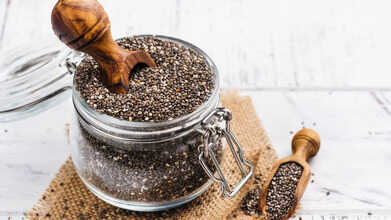- Health Conditions A-Z
- Health & Wellness
- Nutrition
- Fitness
- Health News
- Ayurveda
- Videos
- Medicine A-Z
- Parenting
- Web Stories
Vitamin B6 In Your Favorite Energy Drink Is Making You Jitter

Credits: Canva
Vitamin B6, commonly found in foods like bananas, chickpeas, and poultry, is essential for brain development, immune function, and metabolism. However, increasingly, doctors are seeing a disturbing trend: more Australians are unknowingly suffering nerve damage, migraines, and other serious symptoms after regularly consuming high doses of synthetic vitamin B6, often through energy drinks, multivitamins, and protein powders.
Energy drinks like Red Bull, Monster, Mother, and BSC Energy are under scrutiny for containing significantly more B6 than what’s recommended in a healthy diet.
A standard 250ml can of Red Bull contains 5mg of B6, nearly four times the recommended daily intake of 1.3–1.7mg for adults. BSC Energy's 500ml can goes even further with 10mg of B6, the legal upper limit set by Food Standards Australia New Zealand (FSANZ).
And while a single can won’t push most people into dangerous territory, doctors warn it's the accumulation that matters.
“It’s Not Just One Product”
“There’s no good reason why energy drinks need to have six times the recommended daily intake of B6 in them,” says Alexandra Jones from the George Institute for Global Health, as reported in ABC News. She points out that people often consume these drinks alongside other B6 sources, like breakfast cereals, magnesium tablets, multivitamins, and fortified protein powders, increasing their total intake exponentially.
Pathology labs have reported over 2,700 probable cases of B6 toxicity in Australia just this year, with most cases linked to stacked consumption of various B6-containing products.
Dr Terri-Lynne South, a GP and dietitian, as reported by ABC News, believes these numbers are just the tip of the iceberg. “If an energy drink were sold as a vitamin supplement with 10mg of B6, it would require a warning label,” she points out. Yet many energy drinks bypass this by marketing themselves as beverages, not therapeutic goods.
Case Study: Blackmores and the Warning Signs Ignored
This isn’t the first time vitamin B6 has come under fire. In 2022, Australian supplement giant Blackmores faced mounting criticism, and now a class action investigation, over several of its products allegedly containing dangerously high levels of B6. Health and Me had also previously reported on the same.
ALSO READ: Over-the-Counter Vitamin B6 Linked To Nerve Damage: Hundreds Join Class Action In Australia
Penny Thompson, a 61-year-old from Wollongong, is one of hundreds who reported alarming symptoms, from numbness in the limbs to a paralyzed vocal cord, after prolonged supplement use. “I could not speak, I had to leave my teaching job. My feet felt like they were being stabbed,” she shared with The Sydney Morning Herald.
Despite halting her supplement intake, Penny's symptoms have persisted for years. Her case is now part of a growing legal investigation that may change how supplements and energy drinks are regulated across the country.
What B6 Toxicity Looks Like
Peripheral neuropathy, damage to nerves outside the brain and spinal cord, is the most common result of B6 toxicity. Symptoms may include:
- Burning or tingling in the hands and feet
- Numbness and muscle weakness
- Headaches and dizziness
- Difficulty walking or balance issues
- Gut pain or nausea
These symptoms often develop slowly and are misdiagnosed, delaying treatment and increasing long-term damage.
One man, known as Matthew, began drinking Berocca daily for an energy boost. He later developed extreme burning sensations and nerve pain. His blood tests revealed nearly three times the toxic threshold of B6. “I thought it was just vitamins… I never thought you could poison yourself with it,” he said.
READ MORE: Can Vitamin B6 Deficiency Cause Seizures?
Are Energy Drinks the New Health Hazard?
With B6 levels in food and drinks going largely unchecked for cumulative risk, experts argue that regulators are lagging behind consumer trends.
The Therapeutic Goods Administration (TGA) recently recommended that supplements containing over 50mg of B6 be moved behind pharmacy counters. They’ve also suggested FSANZ re-evaluate the 10mg B6 limit in energy drinks, considering the cumulative exposure from various products.
Still, many in the medical field believe this isn’t enough.
Dr South believes clearer labelling, stronger warnings, and public education are key: “People are inadvertently overdosing… and now we’re starting to see the consequences.”
Energy, at What Cost?
While energy drinks and supplements are often marketed as wellness products, promising more energy, better focus, or immune boosts, their health halo is cracking. The case of B6 toxicity reveals a darker reality: sometimes, more isn’t better.
For healthy individuals without a diagnosed deficiency, experts recommend getting B6 naturally from a balanced diet. Supplements, whether in pill or energy drink form, should be taken only under medical guidance.
Until then, that afternoon pick-me-up may not be as harmless as it seems.
Croissant In a Gut-Friendly Food, Says NHS Surgeon

Credits: Insta and Canva
Whenever we have to think of a quick food, we think of breads. However, we are usually advised against it, but Dr Karan Rajan, NHS Surgeon has a different view to offer. He says that croissant, if made in the traditional way could actually be a gut-friendly food. “This is my legal argument to explain why croissants should be considered a gut health food. It has to be a traditional croissant because it is made using laminated yeast dough that undergoes slow fermentation. This process allows the yeast and lactic acid bacteria to partially break down some of the starches, making the final product easy to digest compared to under-fermented white bread,” he said.
What Is The Right Way To Have A Croissant?
He suggests that if you let a baked croissant cool down before eating, it helps turn the starch into resistant starch. This, also helps feed the bacteria in the colon. “A croissant eaten mindfully for breakfast allows the body to lessen its said,” he said.
So, Is Croissant Really Better Than Regular Bed?
Experts have suggested that when dough ferments, natural bacteria and yeast partially break down the starches and gluten. This also makes the final product easier to digest and gives it a unique flavor.
Whether or not the croissant is healthy really depends on the way it is made. If the croissant is fermented, it is gut-friendly, otherwise, it is not.
What Should People Keep In Mind?
People must go for fermented bread, as it is easier on the stomach. This is especially good for those who feel bloated after consuming regular bread. The fermented bread will also have a lower glycaemic effect, which means they cause a slower rise in blood sugar as compared to unfermented or regular bread. It is also important to note portion control, however, warn experts.
However, one must keep in mind that while most people can have fermented breads, it should be consumed in moderation.
Are There People Who Cannot Have This Gut-friendly Food?
People with celiac disease or serious gluten intolerance should stay away from them. This is because not always does fermentation remove all the gluten. However, fermented options could be better for those struggling with diabetes, however it should still be eaten in moderation.
What one must keep in mind is that fermented breads are smarter treats, but mot an everyday meal. For everyday meal, try to balance it with whole grains, millets, and high-fibre foods.
Dr Ulysses Wu, MD, with Hartford HealthCare also noted that sourdough, which is also a type of fermented bread could have potential health benefits.
“The long fermentation process partially breaks down gluten and phytic acid, a compound that could block mineral absorption. For many people, that makes sourdough easier on the stomach,” Dr. Wu notes.
The fermentation process, he says could lower glycemic index, which could help with blood sugar control. Furthermore, it is high in prebiotics, which can act like fuel for the healthy bacteria already in your gut.
However, he also notes that fermentation does not fully remove gluten, so it must be consumed in moderation.
8 Cups Of This Drink Can Help Increase Your Longevity But More Than That Could Increase Your Risk Of Heart Diseases

(Credit-Canva)
One of the major point of conversations right now is longevity. People are learning day by day about what may affect their biological age and how, why and which way they can lower it. Many studies have pointed out that things like sugar, and some drinks may lower it, however, a new study shows that there may be some unexpected heroes among our daily drink consumption.
A study recently published in the British Journal of Nutrition showed something interesting: drinking about seven to eight cups of tea, coffee, and plain water every day might help you live longer.
Researchers looked at the drinking habits of over 182,000 people and found that hitting this total number of drinks, when balanced well, offered the best protection. It lowered the risk of dying from all kinds of serious problems, including cancer and heart disease. The main finding is that the mix of drinks is key—it's not good to overdo it, as too much might actually be bad for your heart.
How Do Tea, Coffee Or Water Help Your Health?
The research figured out the best possible way to combine these drinks to get the most health benefit:
Optimal Daily Total
The number one rule is to drink a total of seven to eight beverages every day. This total includes your water, coffee, and tea.
Coffee and Tea Ratio
Once you're hitting that daily goal, the best way to mix the coffee and tea is in a 2:3 ratio. This means for every two cups of coffee, you should have three cups of tea. This specific blend was found to be the most powerful for protecting you against dying from heart problems, cancer, and diseases of the lungs and stomach.
Hydration
The experts stress that the most important thing is to just stay hydrated first. Get your total number of drinks up to seven or eight. After you've done that, then you can start swapping some of your water for the healthier mix of coffee and tea.
How Much Tea Or Coffee Should You Drink?
The study also came with important warnings about drinking too much or too little of the mix:
If You Drink Very Little: If you currently have less than four total drinks a day, just adding a cup of coffee or tea won't help much. You need to focus on drinking more water first to reach the main goal of being fully hydrated.
If You Drink Too Much: If you are drinking nine or more cups of fluid a day, replacing water with more tea or coffee could actually raise your risk of dying from heart disease. More is not always better! Finally, the scientists noted two important things:
They can only say there's a link (an observation) between the drinks and living longer; they can't say for sure that the drinks are the direct cause of longer life. The study didn't know how people prepared their drinks—whether they added a lot of sugar or milk, which could affect the health benefits. The main takeaway is to focus on getting your overall daily fluid intake to seven to eight drinks and then use the beneficial mix of coffee and tea wisely.
Is It Safe to Eat Chia Seeds During Pregnancy? Expert Explains

Credits: Canva
Pregnancy is a unique and exciting journey, full of changes, decisions, and the constant desire to give your baby the best start in life. Nutrition becomes particularly important during this time, as what a mother eats can impact both her own health and the development of her baby. One ingredient that has been gaining popularity among expectant mothers is chia seeds.
Though tiny, these seeds are packed with nutrients and can be a versatile addition to a pregnancy diet. To understand their benefits, we spoke with Dr. Deepa, Senior Consultant at Yashoda Super Speciality Hospital Kaushambi, who shared how chia seeds can support maternal and fetal health.
Benefits of Chia Seeds for Pregnant Women
Chia seeds are simple to incorporate into daily meals as you can sprinkle them on oatmeal, mix them into yogurt, blend them into smoothies, or even add them to baked goods.
Their mild taste and texture make them easy to enjoy, which is one reason why many pregnant women are turning to these seeds. According to Dr. Deepa, there are several ways chia seeds can help during pregnancy:
Supports Digestion
Constipation and other digestive issues are common during pregnancy due to hormonal changes and slower digestion. Chia seeds are high in soluble fibre, which can help regulate bowel movements. When soaked in liquid, they expand into a gel-like texture that aids digestion and promotes a feeling of fullness. This not only helps prevent overeating but also supports healthy weight gain, which is important for both mother and baby.
Helps Maintain Blood Sugar Levels
Fluctuating blood sugar levels can be a concern for expectant mothers, sometimes leading to gestational diabetes. The fibre in chia seeds slows sugar absorption into the bloodstream, helping to maintain stable blood sugar and energy levels. By including chia seeds in meals, pregnant women may reduce the risk of sudden sugar spikes and maintain steadier energy throughout the day.
Aids Hydration
Hydration is essential during pregnancy, and chia seeds can play a supportive role. Dr. Deepa points out that chia seeds are versatile and can be added to a wide variety of dishes, from smoothies and salads to yogurt or baked recipes. When mixed with water or other liquids, they absorb moisture, helping to keep the body hydrated and supporting overall wellness.
Nutritional Power for Mother and Baby
Although small, chia seeds are a nutritional powerhouse. They are rich in omega-3 fatty acids, fibre, protein, calcium, and antioxidants. These nutrients support brain development in the fetus, improve digestion, help maintain healthy blood sugar levels, and contribute to overall maternal health.
Dr. Deepa recommends consuming chia seeds in moderation. Eating too many may cause digestive discomfort due to their high fibre content. A typical portion is about one to two tablespoons per day. She also emphasizes that pregnant women should consult their healthcare provider before making significant dietary changes, especially if they have pre-existing medical conditions.
Including chia seeds as part of a balanced, varied diet can help pregnant women feel nourished, support digestion and hydration, and provide essential nutrients for their growing baby. With their versatility and health benefits, chia seeds are a convenient and powerful addition to a pregnancy-friendly diet.
© 2024 Bennett, Coleman & Company Limited

